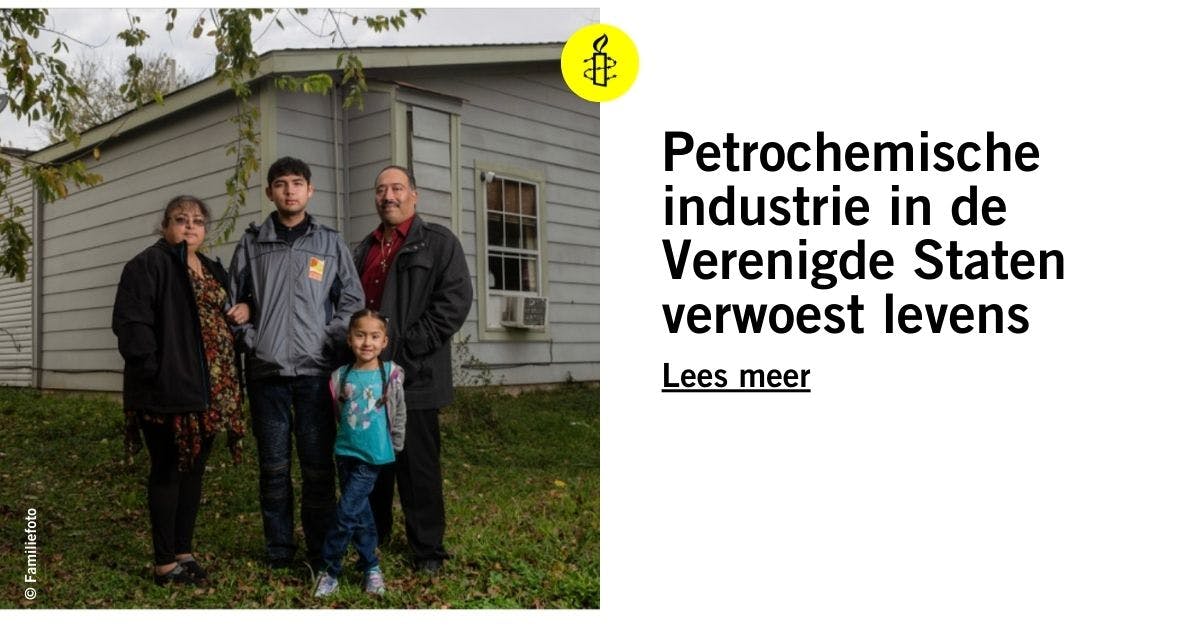Toxic pollution from petrochemical and fossil fuel industries in Texas is having devastating effects on local residents. Reckless practices of industry often result in serious human rights violations. Amnesty International said this in a statement released today.
Report Cost of doing business? Toxic Pollution from the Petrochemical Industry in the United States Describes the damage caused by toxic pollution from hundreds of petrochemical plants along the Houston Ship Canal in Texas. Local residents have little or no access to adequate health care, legal remedies or compensation. Among the victims are many children who continue to breathe in chemicals that cause cancer, respiratory diseases and birth defects. It is contradictory Human rightsBecause everyone has the right to health care and protection from the government.
Short life expectancy
Many factories have poor safety records, violate regulations and repeatedly leak harmful chemicals without taking action or accountability.
Many respondents told Amnesty International that they or a family member had been diagnosed with lung cancer or a respiratory disease such as asthma, or had frequent breathing difficulties. This is consistent with scientific research on the health effects of proximity to the petrochemical industry. Life expectancy in black communities along the Houston Ship Channel is 20 years shorter than in white neighborhoods 16 miles away.
“My family and I are suffering everyday. “There’s always a smell in the air when we go outside,” said Aylar Alondra Torres.
A Dutch company is involved
Pollution is also a concern of the Dutch. LyondellBasell is one of the largest plastics, chemical and refining companies with its headquarters in Rotterdam and 32 branches worldwide. The Channelview complex in the Gulf of Mexico, Texas, is one of the largest petrochemical facilities in the region. On its own website the company calls itself ‘Social Responsibility’. Channelview says it is ‘committed to reducing emissions (…) and complying with all laws and the conditions of our permits.
Despite all these assurances LyondellBasell’s Channelview Complex has a history of noncompliance and contamination of communities and the environment. For example, in October 2021, the company’s subsidiaries agreed to pay a $3.4 million civil penalty for violating the Clean Air Act (Environmental Act). This includes illegal emissions of thousands of tons of hazardous air pollutants and greenhouse gases, including at the Channelview complex.
In January 2023, the Equistar Chemicals LP spill lasted more than 101 hours, releasing more than 88,000 pounds of contaminants, including 1,3-butadiene, benzene, ethylene, and toluene. On that day, local residents complained of black smoke from the complex. In response, LyondellBasell said: “We recognize that operations, including those on our Channelview campus, impact the communities in which we are located. We strive to respect the human rights of all vulnerable people.
Impunity
In Texas, companies can avoid fines if they say the spill was “unplanned and unavoidable.” Also, the government sometimes uses the fines to invest in the industry. The government says it can ignore pollution complaints if they are filed earlier. The large number of factories makes it difficult to determine which factory is the cause of the spill or illness.
A disaster involving the release of toxic materials could, in the worst case scenario, affect tens of thousands of people, but despite major fires and chemical spills in recent years, there is no effective early warning system to warn residents.
Major Human Rights Violations
“The rules are often not enforced,” says Amnesty International’s Alisha Combe. “Many of the companies involved see fines simply as a business risk.” The current system favors corporations and disadvantages the people affected by those corporations. The practices of the global petrochemical industry often result in major human rights violations. This can and must change.’
Similar abuses in Louisiana
A new report by Human Rights Watch Describes the same problem, but in the state of Louisiana. According to the report, the serious health problems of ‘Cancer Alley’ residents in the state of Louisiana are the result of inadequate government and environmental pollution. People are exposed to cancer, respiratory diseases and threats to the health of mothers, children and newborns.
Call for forgiveness
Amnesty calls for much better pollution control, more inspections and better enforcement. The federal government must ensure that Texas follows the law and punishes polluters. Local communities should have access to legal remedies and reparations, including health financing. Amnesty believes that the petrochemical industry should not be allowed to expand further in these areas and that the use of fossil fuels should be phased out as soon as possible.

“Award-winning beer geek. Extreme coffeeaholic. Introvert. Avid travel specialist. Hipster-friendly communicator.”








